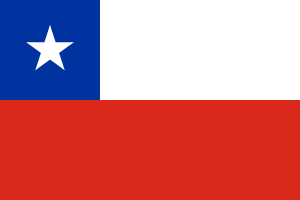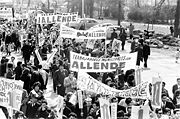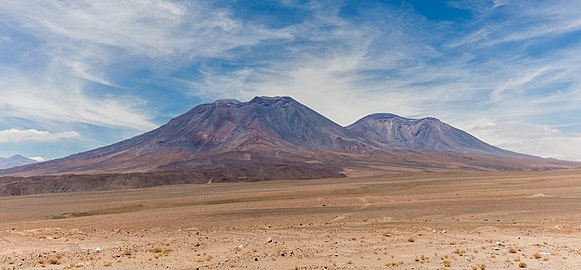Portal:Chile
| Main page | Assessment | Articles | Templates | Translation | Noticeboard | To Do List | Portal |

Chile, officially the Republic of Chile, is a country in western South America. It is the southernmost country in the world and the closest to Antarctica, stretching along a narrow strip of land between the Andes Mountains and the Pacific Ocean. Chile had a population of 17.5 million as of the latest census in 2017 and has a territorial area of 756,102 square kilometers (291,933 sq mi), sharing borders with Peru to the north, Bolivia to the northeast, Argentina to the east, and the Drake Passage to the south. The country also controls several Pacific islands, including Juan Fernández, Isla Salas y Gómez, Desventuradas, and Easter Island, and claims about 1,250,000 square kilometers (480,000 sq mi) of Antarctica as the Chilean Antarctic Territory. The capital and largest city of Chile is Santiago, and the national language is Spanish.
Spain conquered and colonized the region in the mid-16th century, replacing Inca rule, but failed to conquer the independent Mapuche people who inhabited what is now south-central Chile. Chile emerged as a relatively stable authoritarian republic in the 1830s after their 1818 declaration of independence from Spain. During the 19th century, Chile experienced significant economic and territorial growth, putting an end to Mapuche resistance in the 1880s and gaining its current northern territory in the War of the Pacific (1879–83) by defeating Peru and Bolivia. In the 20th century, up until the 1970s, Chile underwent a process of democratization and experienced rapid population growth and urbanization, while relying increasingly on exports from copper mining to support its economy. During the 1960s and 1970s, the country was marked by severe left-right political polarization and turmoil, which culminated in the 1973 Chilean coup d'état that overthrew Salvador Allende's democratically elected left-wing government. This was followed by a 16-year right-wing military dictatorship under Augusto Pinochet, which resulted in more than 3,000 deaths or disappearances. The regime ended in 1990, following a referendum in 1988, and was succeeded by a center-left coalition, which ruled until 2010.
Chile has a high-income economy and is one of the most economically and socially stable nations in South America, leading Latin America in competitiveness, per capita income, globalization, peace, and economic freedom. Chile also performs well in the region in terms of sustainability of the state and democratic development, and boasts the second lowest homicide rate in the Americas, following only Canada. Chile is a founding member of the United Nations, the Community of Latin American and Caribbean States (CELAC), and the Pacific Alliance, and joined the OECD in 2010. (Full article...)
Licancabur (Spanish pronunciation: [likaŋkaˈβuɾ]) is a stratovolcano on the border between Bolivia and Chile, south of the Sairecabur volcano and west of Juriques. Part of the Andean Central Volcanic Zone, it has a prominent, 5,916-metre (19,409 ft)-high cone. A 400–500-metre (1,300–1,600 ft) summit crater containing Licancabur Lake, a crater lake which is among the highest lakes in the world, caps the volcano. There are no glaciers owing to the arid climate. Numerous animal species and plants live on the mountain.
Licancabur formed atop of Pleistocene ignimbrites and has been active during the Holocene, after the ice ages. Three stages of lava flows emanate from the edifice and have a young appearance. Although no historic eruptions of the volcano are known, lava flows extending into Laguna Verde have been dated to 13,240 ± 100 BP and there may be residual heat in the mountain. The volcano has primarily erupted andesite, with small amounts of dacite and basaltic andesite. (Full article...)Miguel Juan Sebastián Piñera Echenique[a] (Spanish: [miˈɣel ˈxwan seβasˈtjam piˈɲeɾa etʃeˈnike] ; 1 December 1949 – 6 February 2024) was a Chilean businessman and politician who served as president of Chile from 2010 to 2014 and again from 2018 to 2022. The son of a Christian Democratic politician and diplomat, he studied business administration at the Pontifical Catholic University of Chile and economics at Harvard University. At the time of his death, he had an estimated net worth of US$2.7 billion, according to Forbes, making him the third richest person in Chile and the 1177th richest person in the world.
A member of the liberal-conservative National Renewal party, he served as a senator for the East Santiago district from 1990 to 1998, running for the presidency in the 2005 election, which he lost to Michelle Bachelet, and again, successfully, in 2010. As a result, he became Chile's first conservative president to be democratically elected since 1958, and the first to hold the office since the departure of Augusto Pinochet in 1990. (Full article...)The economy of Chile is a market economy and high-income economy as ranked by the World Bank. The country is considered one of South America's most prosperous nations, leading the region in competitiveness, income per capita, globalization, economic freedom, and low perception of corruption. Although Chile has high economic inequality, as measured by the Gini index, it is close to the regional mean. Among OECD nations, Chile has a highly efficient and strong social security system; social welfare expenditure stood at roughly 19.6% of GDP.
In 2006, Chile became the country with the highest nominal GDP per capita in Latin America. In May 2010 Chile became the first South American country to join the OECD. Tax revenues, all together 20.2069% of GDP in 2013, were the second lowest among the 34 OECD countries, and the lowest in 2010. Chile has an inequality-adjusted human development index of 0.704, compared to 0.747, 0.720 and 0.577 for neighboring Argentina, Uruguay and Brazil, respectively. In 2017, only 0.7% of the population lived on less than US$1.90 a day. (Full article...)
- ... that Peruvian foreign minister Manuel María Gálvez Egúsquiza was arrested by Chilean troops for refusing to sign peace with the cession of territory during the War of the Pacific?
- ... that Salar de Pajonales in Chile has been used as an analogue for environments on Mars?
- ... that the Peruvian Civil Guard officer Mariano Santos Mateo was nicknamed the Brave Man of Tarapacá because he captured a banner of a Chilean military unit during the Battle of Tarapacá?
- ... that Daniela Ceballos worked with the Football Federation of Chile to supervise safety protocols during the COVID-19 pandemic while playing football herself?
- ... that Earle M. Chiles, a businessman and philanthropist from Portland, Oregon, was also a senator of the board of Ludwig Maximilian University in Munich, Germany?
- ... that Angelito de Canal 13, the mascot of the Chilean television network Canal 13, was inspired by its creator's son?
| This is a list of recognized content, updated weekly by JL-Bot (talk · contribs) (typically on Saturdays). There is no need to edit the list yourself. If an article is missing from the list, make sure it is tagged (e.g. {{WikiProject Chile}}) or categorized correctly and wait for the next update. See WP:RECOG for configuration options. |
Featured articles
- Chilean battleship Almirante Latorre
- Almirante Latorre-class battleship
- Cerro Azul (Chile volcano)
- Calabozos
- El Tatio
- Chilean cruiser Esmeralda (1883)
- Guallatiri
- Hudson Volcano
- Laguna del Maule (volcano)
- Mothers of the Disappeared
- Ojos del Salado
- Pali-Aike volcanic field
- Pisco sour
- South American dreadnought race
- Taapaca
Good articles
- 2010 Pichilemu earthquakes
- 2018 Santiago ePrix
- Agustín Ross Cultural Centre
- Angata
- Los Ángeles Negros
- Apacheta-Aguilucho volcanic complex
- Argentine–Chilean naval arms race
- Atamu Tekena
- Orlando Bosch
- Lorenza Böttner
- Sara Braun
- Monte Burney
- Battle of Caldera Bay
- Felipe Camiroaga
- Chilean battleship Capitán Prat
- Carménère
- José María Caro Martínez
- Chile at the 2014 Winter Paralympics
- Coat of arms of Pichilemu
- Dutch expedition to Valdivia
- El Laco
- El Negrillar
- Milton Friedman
- Fueguino
- Irruputuncu
- Laguna Miscanti
- Laguna del Negro Francisco
- Lascar (volcano)
- Lastarria
- Lazufre
- Licancabur
- Licancabur Lake
- Llullaillaco
- Nevado de Longaví
- Manuel Foster Observatory
- Monturaqui
- Irene Morales
- John Thomas North
- Obligation to Negotiate Access to the Pacific Ocean
- Olca-Paruma
- USS Oneota (1864)
- La Pacana
- Parinacota (volcano)
- Patio 29
- Pichilemu
- Colegio de la Preciosa Sangre de Pichilemu
- Salar de Punta Negra
- Reclus (volcano)
- Murders of María José Reyes and Juan Duarte
- Sammis Reyes
- Riro Kāinga
- Sairecabur
- Salar Ignorado
- San Pedro (Chile volcano)
- Socompa
- Sollipulli
- Tacora
- Tilocálar
- Nevado Tres Cruces
- Tupungatito
- Tuyajto Lake
Featured pictures
-
360-degree Panorama of the Southern Sky edit
-
A 360 degree panorama of a unique cloudscape over La Silla
-
Culpeo MC
-
FCAB EMD GT22CU-3 San Pedro - Ascotan
-
Laguna Miñiques, Chile, 2016-02-08, DD 33-38 PAN
-
Laser Towards Milky Ways Centre
-
Miscanti Lagoon near San Pedro de Atacama Chile Luca Galuzzi 2006
-
Moai Rano raraku
-
SQM GE 289A Boxcab Carmelita - Reverso
-
Volcán San Pedro, Chile, 2016-02-09, DD 18
-
Vortex-street-1
Rules | Match log | Results page (for watching) | Last updated: 2024-06-21 19:47 (UTC)
Note: The list display can now be customized by each user. See List display personalization for details.
- Felipe Mujica (edit | talk | history | links | watch | logs | tools) by MichaelaBlanc (talk · contribs · new pages (5)) started on 2024-06-21, score: 28
- Marié Louw (edit | talk | history | links | watch | logs | tools) by Lachie23 (talk · contribs · new pages (11)) started on 2024-06-21, score: 14
- Emma Ponthieu (edit | talk | history | links | watch | logs | tools) by Lachie23 (talk · contribs · new pages (11)) started on 2024-06-21, score: 14
- Yohanna Lhopital (edit | talk | history | links | watch | logs | tools) by Lachie23 (talk · contribs · new pages (11)) started on 2024-06-20, score: 14
- ¿Ganar o servir? De vuelta al pasado (edit | talk | history | links | watch | logs | tools) by Fran micheli (talk · contribs · new pages (1)) started on 2024-06-19, score: 31
- Hernesto Caballero (edit | talk | history | links | watch | logs | tools) by BrazilianDude70 (talk · contribs · new pages (61)) started on 2024-06-19, score: 14
- List of ambassadors of Sweden to Argentina (edit | talk | history | links | watch | logs | tools) by Saftgurka (talk · contribs · new pages (15)) started on 2024-06-19, score: 14
- 1965 CONCACAF Championship squads (edit | talk | history | links | watch | logs | tools) by SuperSkaterDude45 (talk · contribs · new pages (5)) started on 2024-06-19, score: 18
- Ladeco (edit | talk | history | links | watch | logs | tools) by Hector Ossa J. (talk · contribs · new pages (1)) started on 2024-06-18, score: 95
- List of Dominicans on canonization process (edit | talk | history | links | watch | logs | tools) by JB Hoang Tam 2 (talk · contribs · new pages (14)) started on 2024-06-18, score: 14
- William Braden (edit | talk | history | links | watch | logs | tools) by Jonathan1 (talk · contribs · new pages (2)) started on 2024-06-17, score: 16
- 2018 FIVB Men's Volleyball Challenger Cup qualification (CSV) (edit | talk | history | links | watch | logs | tools) by Bagoto (talk · contribs · new pages (7)) started on 2024-06-17, score: 43
- Ödön Antl (edit | talk | history | links | watch | logs | tools) by Norden1990 (talk · contribs · new pages (9)) started on 2024-06-15, score: 29
- Isaac Ochoterena (edit | talk | history | links | watch | logs | tools) by Mary Mark Ockerbloom (talk · contribs · new pages (1)) started on 2024-06-06, score: 14
- Walter Lemma (edit | talk | history | links | watch | logs | tools) by BrazilianDude70 (talk · contribs · new pages (61)) started on 2024-06-14, score: 23
- Ricardo Meruane (edit | talk | history | links | watch | logs | tools) by Janitoalevic (talk · contribs · new pages (2)) started on 2024-06-14, score: 43
- Leo Wehrli (edit | talk | history | links | watch | logs | tools) by Udibi (talk · contribs · new pages (2)) started on 2024-06-14, score: 16
- Jonas Ecker (edit | talk | history | links | watch | logs | tools) by BeanieFan11 (talk · contribs · new pages (66)) started on 2024-06-14, score: 20
- 2024 OFC U-19 Men's Championship (edit | talk | history | links | watch | logs | tools) by SharkBlade50 (talk · contribs · new pages (2)) started on 2024-06-11, score: 16
- Isabel Lozano (edit | talk | history | links | watch | logs | tools) by Maniakilljoy97 (talk · contribs · new pages (23)) started on 2024-06-13, score: 23
- Antonia Gallegos (edit | talk | history | links | watch | logs | tools) by Maniakilljoy97 (talk · contribs · new pages (23)) started on 2024-06-13, score: 31
- Martina Espejo (edit | talk | history | links | watch | logs | tools) by Maniakilljoy97 (talk · contribs · new pages (23)) started on 2024-06-12, score: 15
- Caroline Leon (edit | talk | history | links | watch | logs | tools) by Keithomf99 (talk · contribs · new pages (1)) started on 2024-06-11, score: 16
- Carex pungens (edit | talk | history | links | watch | logs | tools) by Hughesdarren (talk · contribs · new pages (9)) started on 2024-06-10, score: 31
- Josefina Gutiérrez (edit | talk | history | links | watch | logs | tools) by Lachie23 (talk · contribs · new pages (11)) started on 2024-06-10, score: 43
- Si No Es Contigo (edit | talk | history | links | watch | logs | tools) by MC-123 (talk · contribs · new pages (15)) started on 2024-06-09, score: 16
- Chile national wheelchair handball team (edit | talk | history | links | watch | logs | tools) by Malo95 (talk · contribs · new pages (3)) started on 2024-06-09, score: 31
- Bolivian occupation of Peru (edit | talk | history | links | watch | logs | tools) by AlejandroFC (talk · contribs · new pages (46)) started on 2024-06-07, score: 28
The following Wikimedia Foundation sister projects provide more on this subject:
-
Commons
Free media repository -
Wikibooks
Free textbooks and manuals -
Wikidata
Free knowledge base -
Wikinews
Free-content news -
Wikiquote
Collection of quotations -
Wikisource
Free-content library -
Wikiversity
Free learning tools -
Wikivoyage
Free travel guide -
Wiktionary
Dictionary and thesaurus
Purge server cache
Cite error: There are <ref group=lower-alpha> tags or {{efn}} templates on this page, but the references will not show without a {{reflist|group=lower-alpha}} template or {{notelist}} template (see the help page).























































